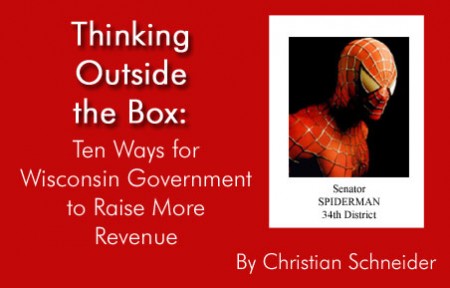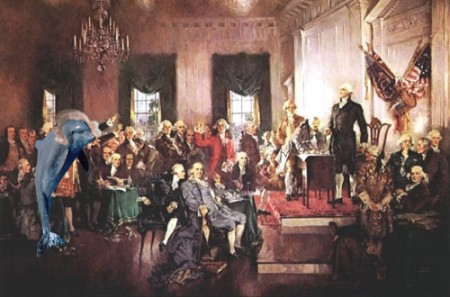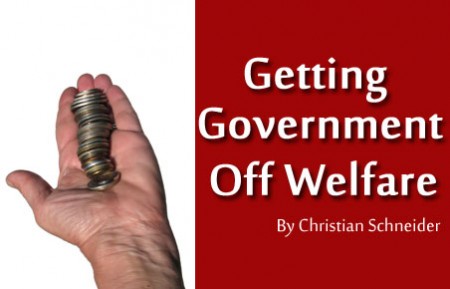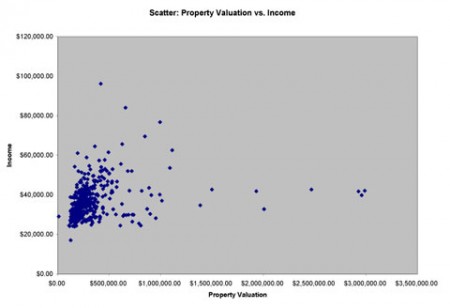 So, as you know, the state has a $2.7 billion deficit to fill.
So, as you know, the state has a $2.7 billion deficit to fill.
Republican gubernatorial candidate Scott Walker says he’s going to make state employees pay for a part of their own pensions as part of his deficit reduction plan. Democrat Tom Barrett’s plan to make up the deficit amounts to forcing people to ask for their health care benefits more politely. And Republican Mark Neumann’s budget plan is to have super-intelligent dolphins invent a time machine, travel back in history, and befriend the Founding Fathers. Having learned the ways and customs of Madison and Hamilton, the Founding Dolphins would return to modern time and take full control of state government based on the original framers’ intent.
(Okay, so I admit I only skimmed his press release – but honestly, his plan is only slightly less plausible than the dolphin one.)
Everyone likes “thinking outside the box” when it comes to budget remedies. Here at WPRI, we tend to favor thinking inside the box to fix what ails the state – spend less, set money aside for budget downturns, don’t violate the Constitution by raiding poor, defenseless trust funds to plug the budget, don’t issue debt to fund ongoing commitments, etc. Somehow, those ideas have become the radical ones.

Certainly, nobody wants to raise taxes to make up any portion of the deficit. In the past few budgets, the state has already jacked up all the politically “popular” taxes – the only people who can afford a carton of cigarettes in Wisconsin are now Herb Kohl, Danny Gokey, and Prince Fielder. (Fielder, knowing he won’t be on the Brewers after next year, will likely play the season in slippers and a bathrobe, with a Lucky Strike hanging from his bottom lip.)
But in the absence of any serious attempt to balance the budget, here are a few revenue enhancers the state could adopt to start to fill in the structural hole. As you can see below, the state has been missing out on some good revenue opportunities – and don’t be surprised to see these end up as part of a gubernatorial platform.
The “Deluxe Package” driver’s license
The mere process of getting a driver’s license is one of the things we all understand to be a horrifying experience. But what if you could pay for deluxe service at the DMV? Here’s how it would work:
For an extra $20 on the cost of your driver’s license, you get a free pass to go up to nine miles per hour over any posted speed limit. This is, of course, the de facto rule anyway – why not codify it and soak people for a little more cash? (A cop once told me “nine you’re fine, but ten, you’re mine.”) You get a little special sticker on your license plates so police officers know you’ve purchased “speeding insurance.”
Also, speaking of license plates, the Deluxe Package would get you the right to put whatever you want on your car tags. If you want to put “BOHUNK,” or “HALNAS,” or “JLBAIT,” (all currently banned, incidentally), then go right ahead. You are welcome to pay extra to explain to the world what a moron you are.
Finally, from now on, everyone gets weighed to determine their real weight for their driver’s license. For an extra $10, you get to knock ten pounds off the weight that shows up on your license. If it’s between that and sit-ups, which one do you think people are going to pick? (Drivers that choose the full deluxe package – speeding insurance, personalized license plates, and the vanity driver’s license, get to knock five bucks off for buying in bulk.)
Revenue Projection: $50 million
The Vengeance Pass
We all go through our lives building up grudges against people who have wronged us. The “Vengeance Pass” would finally allow people to settle their scores, without having to go to the grave with grudges outstanding.
When you turn 90 years old, you will be able to purchase a state-issued license to kill ONE person of your choosing. The only catch is, you would have to do it with your bare hands. (And, as comedian Patton Oswalt suggests, if a 90-year old guy can kill you with his bare hands, you probably deserve it anyway.)
The number of Vengeance Passes available would be limited to five per year, and would be auctioned off by the state on eBay. That way, the guys with only the most intense thirst for revenge would get the passes, and the state would squeeze them for the maximum amount of cash.
The Vengeance Pass also has the added benefit of encouraging people to want to live to be 90 years old. For instance – if I really wanted to strangle the guy who slept with my wife at the Christmas party in 1987, you bet your life I’d stay in tip-top shape in anticipation of my 90th birthday. I wouldn’t need any crappy Medicare – I’d be power juicing all my own food and doing a thousand jumping jacks a day like Jack Lalanne. There’s no way I’d drink and smoke and miss out on my Edmond Dantes moment.
Revenue: $1 million (not counting Medicare/Medicaid savings.)
The Drinking License
The tyranny has gone on long enough. At age 18, we expect young people to be adults in every aspect except one – enjoying an alcoholic beverage. It’s disgraceful that at 18 years old, you can own a shotgun but not shotgun a Pabst Blue Ribbon.
For the cost of a $300 license, an 18 year old would be able to purchase and consume alcohol. Receipt of the license would be incumbent on passing a short course on the dangers of alcohol. Absolute sobriety would still be required of those 18 to 21 who are pulled over driving – with severe penalties for violators.
Of course, some of the revenue generated by the state would have to offset the loss in federal transportation aid that would result by lowering the drinking age, as the feds continue to blackmail us to keep the drinking age at 21.
Revenue: 40,000 licenses at $500 apiece – $20 million
The UW Professor “Fantasy Camp” Program
Remember the Seinfeld episode where Kramer needs $2000 to go to fantasy camp? George observes, “His whole life is a fantasy camp. People should plunk down two-thousand dollars to live like him for a week.”
A few months ago, University of Wisconsin professors were complaining that they only made an average of $110,000 per year. This is for a job where they work on a beautiful campus, have their teaching assistants teach all their classes, take year-long sabbaticals, and hang out with 21-year old girls all day. And they complain they are underpaid.
Under the new plan, professors would actually have to pay the state to work at the UW. If their life isn’t a fantasy camp for academics, I don’t know what is. From now on, if you want to stroke your beard while eating lunch out on Bascom Hill all day, it’ll cost you $30,000 per year.
(And if we can’t find enough professors to pay to teach courses, we’ll just have the super-intelligent time traveling dolphins teach them. They work for tuna.)
Revenue: 6,622 professors, $30,000 apiece = $198 million
The “Visiting Legislator” Program
All the goofball “Good Government” groups are constantly telling us legislative seats are for sale. So as long as everyone buys that line, why not actually have one seat each in the Senate and Assembly that’s actually for sale?
For $10,000 – the cost of entry into the World Series of Poker in Vegas – you can be a state legislator for a day. Introduce a bill making it illegal to dress your dog like Abraham Lincoln. Stand up on the floor of the Assembly and pour oysters down your pants if you want. I might actually pay the cash just so I can wear a superhero costume on the floor and force the Senate President to refer to me as “Senator Spiderman.”
(Incidentally, doing any of the above would make the “Visiting Legislator” indistinguishable from half of our current lawmakers.)
Revenue: $10,000 times 365 days, times two legislative houses – $7.3 million.
Naming Rights
People long ago got used to our sacred institutions being named for corporations. Even some buildings funded with public money, like Miller Park in Milwaukee, don a business name for advertising purposes.
Are we going to pretend this shouldn’t apply to the rest of our public infrastructure? Miller Brewing pays a scant $2.1 million a year to have a stadium named after their business. Think a business wouldn’t pony up twice as much to have people refer to the State Capitol as the Arby’s Dome? Would any die hard outdoorsman refuse to go hiking in Google State Park? (Assuming they could find it in the first place, as Google maps would give them the wrong directions.)
No need to stop with buildings and highways, either. Last week, the Wisconsin Supreme Court handed down a landmark case called Wisconsin Medical Society, Inc. vs. Michael Morgan. SNOOZER. I almost just fell asleep typing it.
You’re telling me more people wouldn’t check in with the Supreme Court if their decisions spiced up their names and included coupons for a free Netflix movie? And it’s all in the interest of public education. Read about the governor stealing $200 million from the state’s malpractice fund, get a free rental of Herbie: Fully Loaded.
Revenue: $100 million.
Allowing Individuals to Protect Themselves and Exercise Their Second Amendment Rights By Purchasing a $200 license to Carry a Concealed Weapon, as 48 Other States Do.
Hah – just kidding. Now I’m just being silly.
The Violent Offender Telethon
Most of the items on this list involve allowing individuals the right to pay to do something they want. But this one makes people pay to prevent something they don’t want to happen.
Each year, Wisconsin releases hundreds of violent criminals back into society. That problem will only be expedited with Governor Jim Doyle’s plan to release many of these offenders early.
There’s always a problem placing these criminals back in society – but where many see a problem, I see an opportunity.
Once a month, Wisconsin Public Television should hold a telethon, where they parade out all of the violent offenders that will be released that month. Then each community in Wisconsin gets to call and pledge money in order to avoid having each criminal relocated in their town. The community that forks over the most cash is exempt from prisoners being dropped off on their streets for one month, until the next telethon.
I already know your first question – “Wouldn’t this system benefit wealthy, white communities, who could afford to pony up the cash?” The answer is: Yes. Of course it will. But right now, all these felons are dropped off in Milwaukee, anyway – why not make the rich folks pay a little for it, instead of avoiding sex offenders for free?
Revenue: $100 million.
Daughter Insurance
Every summer in Madison, prospective students go through the campus orientation process, where they walk around the UW and see all the buildings. Daughters are accompanied by their poor, horrified fathers, who know that as soon as they leave their little girl’s side, it’s open season. Dropping your daughter off at the UW is like dropping a $100 bill on the floor of Congress – there will be a bloody pileup of guys diving to get their hands on it.
With tuition at the UW being so cheap (second to last in the Big Ten, or Big Thirteen, or whatever it is), plenty of fathers can probably afford to kick in for “Daughter Insurance.” Under this plan, your daughter will be accompanied at all times by an ex-Navy SEAL, trained in the ancient arts of Kung Fu, Jujitsu, and General Tso’s Chicken. If any young man attempts to approach your daughter, he will instantly be struck down by a swift karate chop to the larynx.
But here’s the true beauty of the program – potential suitors for your daughter could submit an application in order to speak to her. They would be required to submit a writing sample, blood test, geneology report, resume, and a $20 processing fee in order to see your daughter socially. More revenue for the state, and you will be able to avoid any accusations that you are being completely unreasonable.
Revenue: $60 million, not counting the salaries for the Navy SEALS. If they won’t work for cheap, we can use actual seals, whose bite apparently packs a wallop. (They are also rumored to be efficient at processing paperwork.)
Prisoner Deportation
The Wisconsin Department of Corrections spends about $55,000 per inmate per year to house 22,000 prisoners. This is too much.
The technology of today has rendered prisons obsolete. Instead of forking over $55,000 per inmate, we simply equip each one of them with a GPS ankle bracelet, and buy them each a $500 one-way plane ticket to Mississippi. If the ankle bracelet senses the inmate has left Mississippi for any reason, a compartment opens up, and a small scorpion jumps out and stings the inmate to death.
If the scorpion is himself a felon, then it will have to wear an ankle bracelet with an even smaller scorpion inside.
Revenue / savings: $1 billion per year.
So there you have it: $1.536 billion per year in revenue, without anyone in the state really noticing any difference in their lifestyle. (Unless, of course, you are one of the unfortunate ones who gets strangled to death by a 90-year old or karate chopped by a seal.) The state is missing out on opportunities to use the market for some serious revenue opportunities – and the gubernatorial candidates didn’t even have to pay me all their lavish consulting fees to come up with these. I do it for the kids.
Or they could just stop spending more than they take in. Either way.

 So, as you know, the state has a $2.7 billion deficit to fill.
So, as you know, the state has a $2.7 billion deficit to fill.




 In fact, in 2003,
In fact, in 2003,